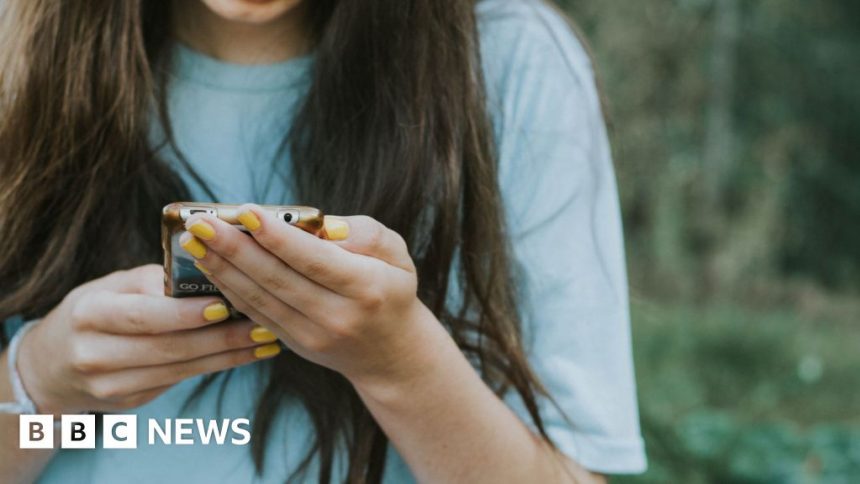Girl without smartphone unable to join in lesson
A mum has said her 11-year-old daughter returned home from school in tears because she did not have a smartphone to use in class.
Celeste Lewis said she felt guilty after her daughter Ava’s school, Whitchurch High in Cardiff, encouraged pupils to use their phones in lessons to do things like look up locations on Google Earth.
Unlike in England, there is no guidance advising schools to ban mobile phones in classrooms in Wales, with the Welsh government saying they could be “used effectively to support learning”.
The school said it had an “acceptable use” policy for phones which was regularly reviewed, students were educated on it, and issues were discussed through staff and student groups.
Ms Lewis said she began to feel “pressure” on parents to buy smartphones as her daughter left primary school, but decided not to over fears about how it might affect Ava’s mental health.
“In Year 6 I’d say every single kid in her class had a smartphone except for her,” said the charity worker.
“It was so ingrained, it’s like ‘buy a school uniform, buy some shoes, buy a smartphone’.”
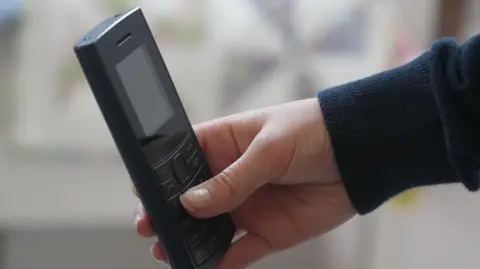
She said she “naturally assumed” smartphones would not be used in class, but Ava came home crying “within the first week or two” of starting at Whitchurch High School because she did not have one to use in class.
Ms Lewis said the school had been “really helpful, really kind” and offered Ava a laptop to help her in lessons.
However, she said she still felt caught between a “rock and a hard place”.
“I feel guilty now as a parent,” she said.
“We said ‘if we give you an old school Nokia, you can phone your friends, you can message your friends’.
“There’s still downsides to that phone. She doesn’t get the emojis that her friends send. You’ve got messages, you’ve got phone calls and you’ve got Snake.”
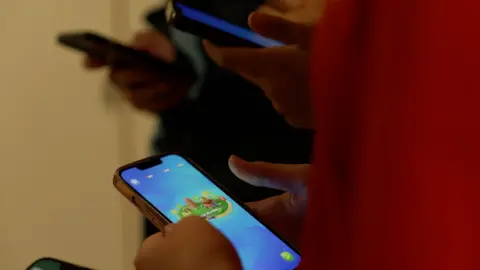
Whitchurch High said every school had its own policies on phones and electrical devices, and it had developed “an acceptable use” policy.
“We regularly review our policy and educate students on acceptable and appropriate use,” said a school spokesperson.
“Our main vehicle for this is through our relationships, wellbeing and health lessons, supported by other relevant curriculum areas and our behaviour and achievement policy.
“We regularly review all our policies and discuss issues through our staff and student improvement groups to support with decision making and improvement priorities. Our governing body are also involved in discussions on key issues and scrutinise our policies prior to adoption.”
Ofcom figures suggested 97% of children own a mobile phone by the age of 12.
But groups like Smart Phone Free Childhood, of which Ms Lewis is a member, are campaigning for parents to reconsider what age they allow their children to have phones.
Both England and Scotland issued guidance designed to help schools ban smartphones earlier this year.
But schools in Wales are encouraged to make their own choice, meaning some neighbouring schools have different policies.
One school in Conwy county recently introduced a system where pupils lock their phones in a special bag for the day.
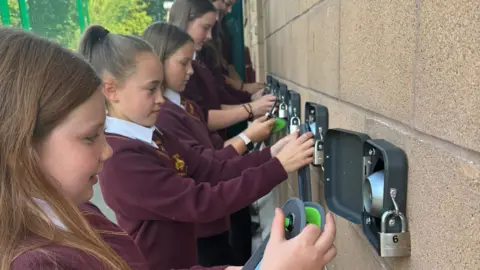 Roger Beech
Roger BeechAnd Cardiff West Community High School, just four miles from Ava’s school, has banned phones for pupils, staff and visitors during the day.
“When they come on site, phones are away. They’re not heard, and they’re not used,” said Mike Tate, the school’s head teacher.
He said he believed the ban had been a “driving force” behind improved behaviour with a “75% reduction” of fights in school, as well as a drop in exclusions, particularly related to defiance.
“What we’re also seeing is greater engagement in classes, an increase in attendance to school and punctuality to lessons has increased,” Mr Tate added.
He also said staff sickness levels had also dramatically improved, attributing that to improved pupil behaviour in class.
To make the changes, the school, which services the Ely community, has partly returned to paper after years of issuing updates and timetables online.
From September pupils began receiving traditional paper organisers again, and staff said many were bringing in school bags for the first time in years.
“We see many pupils actually talking to one another in social situations, even playing cards at lunchtime as opposed to on their phones,” said Mr Tate.
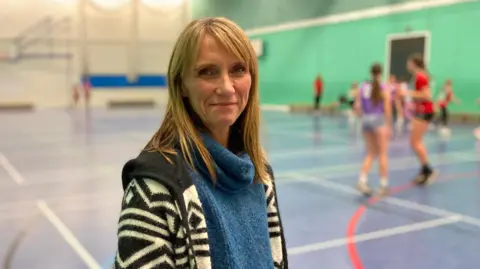
The school said it had been contacted by about 10 others in south Wales since introducing the ban, asking for guidance on how it could be done.
But among parents, opinions were mixed.
Mum-of-three Gwenda said all her children were given smartphones when they got to secondary school to help her stay in touch while allowing them more freedom.
“There’s good and bad that comes with them,” she said.
“It’s the way that the world is today, they need access. They need to feel included in groups of friends.
“They learn a lot from mobile phones – they learn a lot of bad, but they also learn a lot of good.”

Bethan, also a mum-of-three, said she thought smartphones should be banned for under-16s but she also worried about her children being left out.
She said her 15-year-old son missed out on his first invite to the cinema because she had not allowed him on messaging apps other children used.
“I would like the government to do something about it and take it out of parents hands,” she said.
The Welsh government said it recognised the impact mobile phones could have on “the health and wellbeing of children and young people” and said “almost all” schools in Wales had policies prohibiting their use in lessons.
“Mobile phones can be used effectively to support learning, and it is important children and young people are taught about online safety, including the use of social media.
“The education secretary will be working with schools to ensure they have policies in place that reduce the wellbeing impacts of mobile phones and promote learning.”
Additional reporting by Nia Price and Matthew Bassett
For more on this story, watch Wales Live on BBC iPlayer




